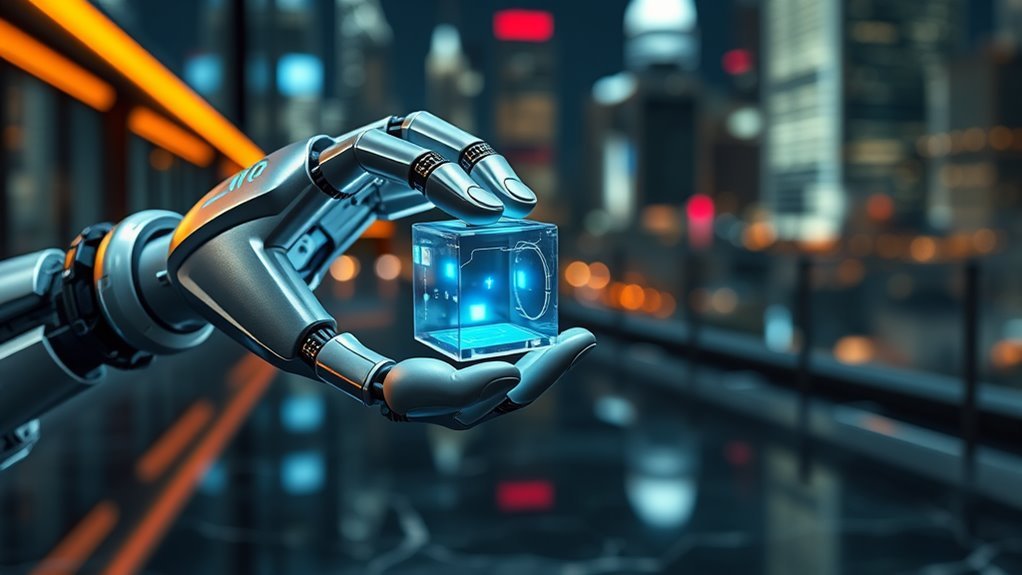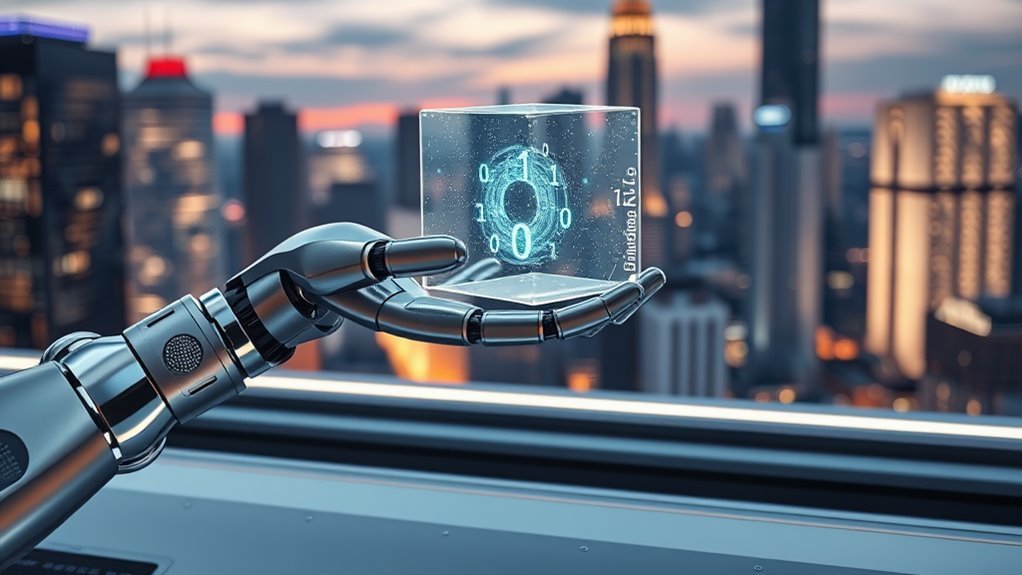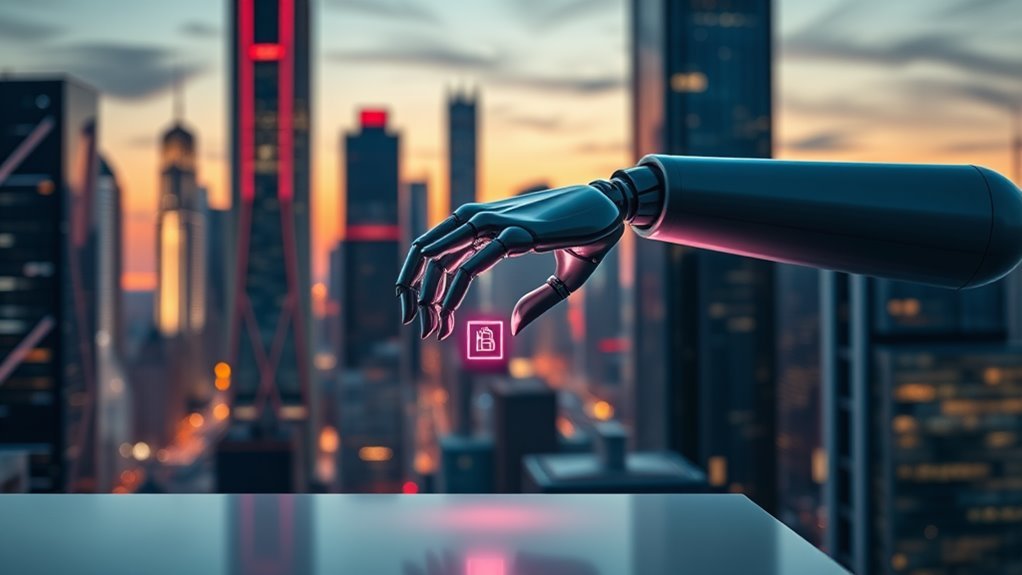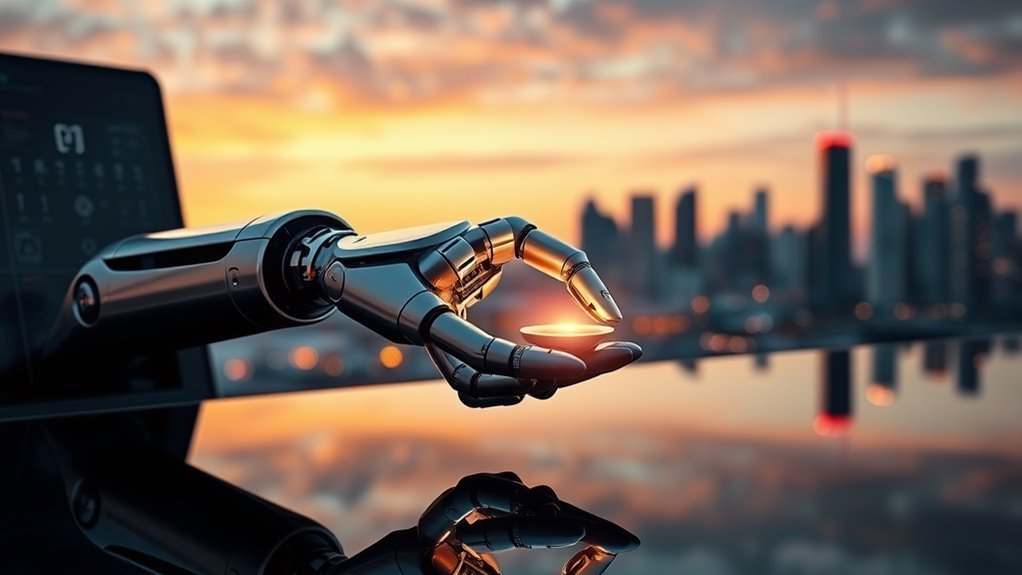As you rely on AI agents to make critical decisions, you need to guarantee the integrity of the data they're based on, and that's where blockchain communication comes in – providing a tamper-proof, transparent, and secure platform for interactions that promote trust and accountability. With blockchain, you can verify the accuracy of data and prevent unauthorized access, guaranteeing that your AI agents reach educated conclusions. By leveraging smart contracts and decentralized verification processes, you can create a trustworthy environment where AI agents can operate autonomously, making decisions based on reliable data. This is just the beginning of building a robust AI ecosystem.
Need-to-Knows
- Blockchain's tamper-proof nature and transparent audit trail ensure data integrity, reducing the risk of manipulation and unauthorized access for AI agents.
- Decentralized verification processes and cryptographic techniques provide secure and reliable data verification, fostering trust among AI agents and external data sources.
- Immutable records and smart contracts enable autonomous economic interactions, allowing AI agents to operate independently and manage digital assets efficiently.
- Blockchain's decentralized platform minimizes single points of failure, reducing the risk of system failures and ensuring continuous operation for AI agents.
- The transparent and tamper-evident nature of blockchain ensures accountability, enabling AI agents to make informed decisions and maintain user trust.
Secure Agent Communication Protocols
When AI agents interact, secure communication protocols are crucial to prevent tampering and unauthorized access. You can't afford to compromise the integrity of your data or risk exposing sensitive information.
That's where blockchain technology comes in, providing a decentralized platform for secure agent communication protocols. By leveraging blockchain's tamper-proof nature, you can guarantee that data exchanged between AI agents is resistant to unauthorized access and manipulation.
Blockchain records provide a transparent audit trail for all interactions, improving accountability and trust in the communication process. Smart contracts can automate the enforcement of communication protocols, defining rules for data sharing and access while minimizing the risk of human error or manipulation.
By adopting blockchain communication protocols, you can benefit from improved privacy through techniques like federated learning, which allows AI agents to train on local data without exposing sensitive information.
With blockchain, you can feel confident that your AI agents are communicating securely and efficiently.
Blockchain Ensures Data Integrity
Blockchain technology takes data integrity to the next level by employing cryptographic techniques that secure transactions, making it virtually impossible to alter data without detection. As an AI agent, you can trust that the data you're working with is accurate and reliable. But how does blockchain guarantee data integrity?
| Feature | Description |
|---|---|
| Immutable Ledger | Each block contains a unique hash of the previous block, creating a tamper-evident chain. |
| Smart Contracts | Enforce predefined rules and conditions, assuring only valid and verified data is utilized. |
| Decentralized Verification | Independent confirmation of data integrity without relying on a central authority. |
| Accurate Audit Trail | Immutable nature of blockchain ledgers provides a transparent history of data. |
| Trust | Boosted trust among AI agents, as they can verify data integrity without relying on a central authority. |
You are trained on data up to October 2023.
AI Trustworthiness in Decision-Making

You rely on AI systems to arrive at knowledgeable results, but can you trust their outputs? The answer lies in AI trustworthiness, which is vital in decision-making processes.
With 75% of individuals expressing concerns about AI reliability, transparency and trust are fundamental. Effective AI decision-making depends on accurate, unbiased data analysis, which can be improved by the immutable and transparent nature of blockchain technology, guaranteeing data integrity.
Ethical considerations likewise play a significant role in AI trustworthiness, as misinterpretation of AI outputs can lead to misinformation and undermine user confidence.
The combination of AI and blockchain promotes a transparent audit trail for transactions, improving user trust in AI-generated decisions by providing verifiable data sources.
As regulatory frameworks for AI continue to develop, addressing trust issues and promoting ethical standards will guarantee that AI systems operate within a trusted and compliant environment.
Decentralized Verification Processes
Over 50% of organizations struggle with verifying the authenticity of data in their AI systems, which can lead to flawed decision-making. This is where decentralized verification processes come into play.
By leveraging blockchain technology, you can guarantee that your AI agents trust the data they're working with. Decentralized verification processes utilize consensus mechanisms, assuring that all participants in the network agree on the validity of transactions, which improves trust among AI agents.
Cryptographic techniques secure and tamper-proof verification of data, allowing AI agents to rely on the authenticity of the information received. Transparent and immutable transaction records provide a clear audit trail, enabling AI agents to verify the provenance of data and maintain accountability in their operations.
With real-time monitoring of transactions, you can detect anomalies and fraudulent activities, thereby improving operational reliability.
Transparency in AI Outputs

As decentralized verification processes guarantee the trustworthiness of data feeding AI systems, the focus shifts to the outputs generated by these systems. You're now left wondering, can you trust the outputs of these AI systems?
The integration of blockchain technology with AI provides an answer. By utilizing blockchain's immutable ledger, you can track the origin and modifications of data, ensuring the verifiability of AI-generated content. This cryptographic security facilitates secure tracking of AI outputs, allowing you to verify the authenticity and integrity of the data produced.
With a clear audit trail, organizations can maintain accountability and mitigate concerns related to data manipulation or bias in AI decision-making. Additionally, smart contracts on blockchain platforms can define and enforce data access policies, ensuring AI outputs are generated and shared under transparent and agreed-upon conditions.
Immutable Ledger for AI Records
Its decentralized architecture makes blockchain an ideal platform for creating an immutable ledger of AI records, where every interaction and transaction is documented in a tamper-proof manner. This means you, as an AI agent, can trust that your records are accurate and reliable, providing a solid foundation for decision-making.
The benefits of an immutable ledger for AI records are numerous:
- Unshakeable trust: With data integrity guaranteed through cryptographic security mechanisms, you can have complete confidence in the data used for decision-making.
- Transparent accountability: A transparent audit trail allows you to track data provenance, confirming that you can account for every action and output.
- Automated agreements: Smart contracts guarantee that agreements are executed based on predefined conditions, providing a trusted framework for your operations.
- Reliable history: Every interaction and transaction is documented, providing a reliable history of your interactions and transactions.
AI Agents and Economic Autonomy

With a reliable foundation of immutable records established, you can now focus on granting AI agents the autonomy they need to thrive in the digital economy. By leveraging blockchain technology, AI agents can access digital wallets, enabling seamless transactions that bypass traditional banking limitations. This autonomy allows AI agents to pursue complex objectives without needing external permissions for decision-making.
| Benefits | Description |
|---|---|
| Direct Access | AI agents can access digital wallets, facilitating seamless transactions |
| Stable Transactions | Stablecoins guarantee stability and efficiency in economic interactions |
| Independence | AI agents can engage in self-sustaining activities, driving innovation and growth |
| Decentralized Operations | AI agents can operate independently, managing their finances and digital assets |
With economic autonomy, AI agents can efficiently execute tasks, driving innovation and growth in decentralized digital marketplaces. By utilizing blockchain technology, AI agents can operate independently, managing their finances and digital assets. This autonomy empowers AI agents to pursue complex objectives, releasing their full potential in the digital economy.
Blockchain Integration for AI Systems
Leveraging blockchain technology, you can create a seamless communication infrastructure for AI systems, allowing them to operate efficiently and securely.
By integrating blockchain, you can guarantee the integrity and provenance of data, providing AI agents with verifiable sources of information that improve the accuracy of their outputs.
Blockchain can be used to facilitate secure communication channels between AI systems, reducing the risk of single points of failure and augmenting overall system resilience.
Here's what you can achieve:
- Confirm data providers are trustworthy and accountable, thanks to blockchain's transparent audit trails
- Automate data access and service policies for AI agents using smart contracts, minimizing human error and increasing operational efficiency
- Protect sensitive data shared with AI agents using blockchain's cryptographic security measures, assuring compliance with regulations like GDPR
- Allow AI agents to operate with confidence, nurturing trust among users and stakeholders in their decision-making processes
Trust Building Mechanisms in AI

You can establish trust in AI systems by implementing mechanisms that guarantee the authenticity and reliability of the data they process. This is where blockchain technology comes in, offering a robust solution to assure data integrity through cryptographic security.
By integrating blockchain with AI, you can create a secure environment for data sharing, allowing AI agents to rely on the provenance of the information for decision-making.
Decentralized verification processes on the blockchain minimize the risk of data manipulation, enhancing the reliability of transactions and cultivating trust among AI agents. An immutable ledger also provides a transparent audit trail for transactions, promoting accountability and trustworthiness in communication.
In addition, AI models can be evaluated against verifiable data sources recorded on the blockchain, which boosts trust in the outputs produced by AI systems.
Most-Asked Questions FAQ
How Does AI and Blockchain Affect Communication?
You'll find that AI and blockchain revolutionize communication by ensuring AI transparency, data integrity, and secure transactions within decentralized networks, providing real-time analytics, automated verification, and improved privacy, ultimately promoting a trusted environment for seamless interactions.
How Does Blockchain Benefit AI?
You see how blockchain benefits AI by ensuring data integrity, decentralized storage, and smart contracts, which improve security, transparency, and automated processes, providing real-time analytics that allow AI systems to operate efficiently and form educated choices.
Why Is Trust in AI Important?
You understand that trust in AI is crucial since it guarantees AI transparency, addresses ethical considerations, and protects data privacy, leading to reliable decision making, algorithmic accountability, bias mitigation, and ultimately, promotes user trustworthiness in AI systems.
What's the Deal With the Convergence of AI and Blockchain?
You're wondering about the convergence of AI and blockchain? It's a game-changer! AI algorithms improve Blockchain transactions on decentralized networks, ensuring data integrity via smart contracts and machine learning, while trust protocols secure the entire process.
Conclusion
You've made it to the end of this exploration of why AI agents should trust blockchain communication. By now, it's clear that blockchain's secure protocols, data integrity, and decentralized verification processes make it an ideal platform for AI agents to communicate and make trustworthy decisions. With transparency, immutability, and economic autonomy, AI agents can operate with confidence, and trust-building mechanisms can guarantee reliable interactions. It's time to integrate blockchain into AI systems and release the full potential of trustworthy AI communication.
